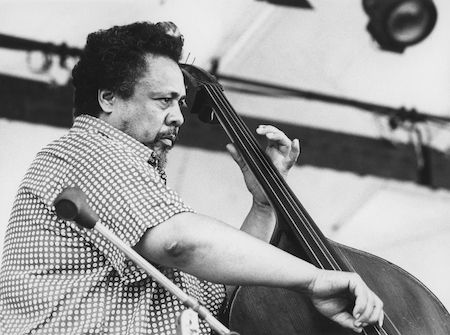Jan 13, 2026 2:09 PM
More Trump-Kennedy Center Cancellations
The fallout from the renaming of the John F. Kennedy Center for the Performing Arts to include President Donald…

Recordings of Charles Mingus’ 1964 and 1975 performances in Bremen, Germany, represent two very different periods of the bandleader’s career.
(Photo: Joesph L. Johnson)Charles Mingus—rightly or wrongly—is frequently characterized as a wildly inventive but frustrated composer, caught between mindful brilliance and the realities of the world he had to navigate.
It’s an idea revisited on the four-disc Charles Mingus @ Bremen 1964 & 1975 (Sunnyside), where the bandleader is frozen in time, first as a figurehead of the avant-garde and then a decade later as an elder statesman of the genre.
The fecundity of live recordings from the bassist in 1964 doesn’t make the music here any less enticing: Reedist Eric Dolpy flies through “Hope So Eric” and trumpeter Johnny Coles spouts gold on a 33-minute version of “Fables Of Faubus.” That’s just disc one.
“Around ’64 is when he’s really experimenting and thinking broadly about his compositions and how to communicate with the musicians who are playing his work,” said Nichole Rustin, a history professor at the Rhode Island School of Design and author of The Kind of Man I Am: Jazzmasculinity and the World of Charles Mingus Jr. “And then in ’75—this is when he’s recognized as a senior musician. He was getting his flowers, as they say.”
During a decade of both growth and tumult, Mingus continued honing a distinctive voice, one that retained a familiar sonic strain. As baroque as some of the music would become, and despite a slower pace of recording in the late ’60s and early ’70s, blues and swing remained incandescent ingredients in Mingus’ compositions.
“I’m thinking of a quote by Stanley Crouch about Mingus’ music, where he says that Mingus recognizes that if a form of music was good in the ’20s, it’s good now,” Rustin said. “And I think that investment in the traditions of the music, expanding the boundaries of it while keeping the core there, is what Mingus was invested in.”
During the 1975 performance, “For Harry Carney” ties the band to the past while paying tribute to a reedist who long served in Duke Ellington’s band. But there’s also the stately swing of “Duke Ellington’s Sound Of Love” and an admittedly outside take of “Cherokee.”
A profound list of musicians, political figures and relatives are referenced in the bandleader’s song titles, too—everyone from Dolphy to governors and the bassist’s wife. But even if “Sue’s Changes” alludes to an arts magazine that Mingus’ wife ran, there still are myriad possible interpretations of the title. Maybe it’s about her development as a person. Or a reference to a progression that Mingus, who died in 1979, wrote with her in mind. Maybe it’s something totally different.
“What I like about when Mingus writes a song for you, it really is about honoring what you’re bringing to him—and consequently to the music,” Rustin said. “So, really, ‘Sue’s Changes’ is all about celebrating and appreciating [their] relationship.”
Wading through Charles Mingus @ Bremen 1964 & 1975 might not reveal the meaning of the 15 tunes here, but it sets a scene. And it places one of the genre’s most consequential composers on a continuum of development as a writer, a bandleader and a person who moved through this fraught world. DB
This story originally was published in the December 2020 issue of DownBeat. Subscribe here.

Belá Fleck during an interview with Fredrika Whitfield on CNN.
Jan 13, 2026 2:09 PM
The fallout from the renaming of the John F. Kennedy Center for the Performing Arts to include President Donald…

Peplowski first came to prominence in legacy swing bands, including the final iteration of the Benny Goodman Orchestra, before beginning a solo career in the late 1980s.
Feb 3, 2026 12:10 AM
Ken Peplowski, a clarinetist and tenor saxophonist who straddled the worlds of traditional and modern jazz, died Feb. 2…

The success of Oregon’s first album, 1971’s Music Of Another Present Era, allowed Towner to establish a solo career.
Jan 19, 2026 5:02 PM
Ralph Towner, a guitarist and composer who blended multiple genres, including jazz — and throughout them all remained…

Rico’s Anti-Microbial Instrument Swab
Jan 19, 2026 2:48 PM
With this year’s NAMM Show right around the corner, we can look forward to plenty of new and innovative instruments…

Richie Beirach was particularly renowned for his approach to chromatic harmony, which he used to improvise reharmonizations of originals and standards.
Jan 27, 2026 11:19 AM
Richie Beirach, a pianist and composer who channeled a knowledge of modern classical music into his jazz practice,…